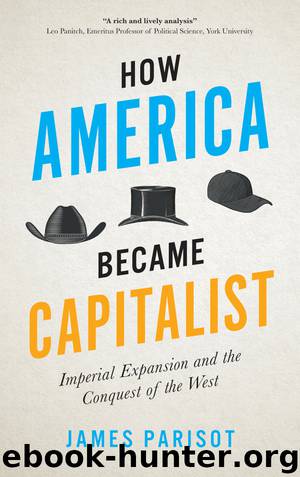How America Became Capitalist by James Parisot;

Author:James Parisot;
Language: eng
Format: epub
Publisher: Book Network Int'l Limited trading as NBN International (NBNi)
5
The Progress of Empire
The western course of empire continued to expand and by the early 1800s frontier settlers penetrated halfway through the continent into many territories on their way to becoming states. For Henry Schoolcraft, who wrote one of the first thoroughly documented accounts of the region, Missouri and the old west were driven by what he called the “progress of empire.”1 And by 1870 L.U. Reavis commented on the “sublime march of the American people in the course of the star of empire in its majestic career across the continent.”2 St. Louis was to be celebrated as the center of growing empire in the west, comparable to New York City in the empire state back east.
The purpose of this chapter is to examine the westward movement of empire into the southern antebellum frontier.3 I focus specifically on three territories: Missouri, Arkansas, and Texas. All three states were the “wests” of their time. As Thomas Hart Benton, editor of the St. Louis Enquirer, wrote in 1819, “it is time that western men had some share in the destinies of this Republic.”4 The southwestern frontier was, like other parts of the country, a society with capitalism. As one commentator put it, “The farmers of the West are independent in feeling, plain in dress, simply in manners, frank and hospitable in their dwellings, and soon acquire a competency by moderate labor.”5 But this population quickly intersected with mining and railroad companies, and others seeking out western space for profitable use. As the same writer explains, western settlers tended to emigrate in three waves; first, pioneer families would occupy land and build log cabins, secondly, settlers who purchased the land built more sophisticated dwellings and cleared the land, and third, “The men of capital and enterprise come. The ‘settler’ is ready to sell out, and take the advantage of the rise of property—push farther into the interior, and become himself, a man of capital and enterprise in turn.”6 In other words, these territories emerged in an era in which the logic of capital was gradually coming to increasingly organize human social life and continued to push against non-capitalist frontier relations.
This chapter aims to explore these complexities on the southwestern frontier of white-settler colonialism. Rather than focusing on the more commonly discussed slave states such as Mississippi, by concentrating on the complexities of Missouri, Arkansas, and Texas, the chapter provides a lens to understand the ways “the south,” a complex social formation, was both an empire of slavery and something more multi-layered than regional generalizations based solely upon the deep south might account for.
Download
This site does not store any files on its server. We only index and link to content provided by other sites. Please contact the content providers to delete copyright contents if any and email us, we'll remove relevant links or contents immediately.
International Integration of the Brazilian Economy by Elias C. Grivoyannis(106934)
The Radium Girls by Kate Moore(12003)
Turbulence by E. J. Noyes(8008)
Nudge - Improving Decisions about Health, Wealth, and Happiness by Thaler Sunstein(7680)
The Black Swan by Nassim Nicholas Taleb(7090)
Rich Dad Poor Dad by Robert T. Kiyosaki(6579)
Pioneering Portfolio Management by David F. Swensen(6275)
Man-made Catastrophes and Risk Information Concealment by Dmitry Chernov & Didier Sornette(5981)
Zero to One by Peter Thiel(5768)
Secrecy World by Jake Bernstein(4727)
Millionaire: The Philanderer, Gambler, and Duelist Who Invented Modern Finance by Janet Gleeson(4448)
The Age of Surveillance Capitalism by Shoshana Zuboff(4267)
Skin in the Game by Nassim Nicholas Taleb(4224)
The Money Culture by Michael Lewis(4174)
Bullshit Jobs by David Graeber(4164)
Skin in the Game: Hidden Asymmetries in Daily Life by Nassim Nicholas Taleb(3977)
The Dhandho Investor by Mohnish Pabrai(3745)
The Wisdom of Finance by Mihir Desai(3721)
Blockchain Basics by Daniel Drescher(3566)
